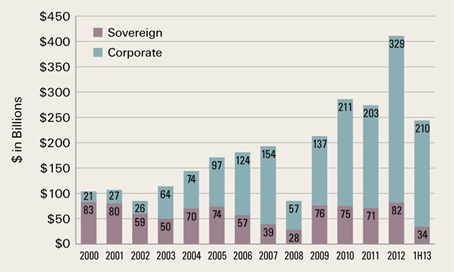Emerging Market Debt Default judgement
Post on: 9 Апрель, 2015 No Comment

Equities/Bonds
Reports that emerging market countries have borrowed a record amount of money in capital markets in the first half of 2014 have given rise to suggestions that investors are caught up in ‘debt market euphoria’. There are logical drivers for this growth: investors seem to be enticed by a search for yield, while emerging countries are making the most of low interest rates and taking the opportunity to refinance debts. Nevertheless, with emerging sovereign bond sales climbing as high as $69.5bn (€54bn)over this period (a 54% increase over the same period in 2013) there are warnings about the quality of this debt, alongside reminders that the emerging markets have been prone to crises. These include the Mexican peso crisis in 1994-95, the 1997 Asian financial crisis and the Argentine great depression in 2001-02.
The Argentine experience, in particular, continues to provide lessons about the potential pitfalls. Certain investors who have held out for full payment of principal and interest on the bonds following the default in 2001, have been locked in legal proceedings with the state ever since. In June, the US Supreme Court refused to lift an injunction restraining Argentina from making payment to those bondholders who accepted Argentina’s restructuring proposal (the ‘exchange bondholders’) without also making payment to the holdout investors.
The impact of the decision was immediate, with the price of Argentinean bonds and share prices in Buenos Aires falling on the day the decision was handed down. These have since rallied, but of greater concern is the impact of Argentina entering into default after missing the 30 July deadline for an interest payment to the exchange bondholders – its eighth default in its 200-year history.
The consequences of this default could be severe for an economy that is already in recession, particularly if bond prices collapse and the country’s borrowing costs increase to unsustainable levels. Others argue that these fears are overstated, pointing to factors such as an oil drilling boom and Argentina’s huge shale resources, which should help secure its medium to long-term prospects.
Global implications
While attention is fixed on this unfolding story, the legal precedents set by the decision and its implications for emerging market debt have not been given as much attention.
The US courts have established that a ‘boiler plate provision’ of these bonds (the pari passu clause) requires sovereign debtors to make full payment to holdout bondholders (even where their bonds were purchased in the secondary market) if any payments are made to the exchange bondholders. In doing so, the ruling emphatically confirms that sovereign debtors will not be excused from the strict terms of their contractual obligations. This is significant blow to those (including the US and other western governments) that advocate in favour of providing relief to heavily indebted countries with high levels of poverty.
There are further concerns, including those expressed by the United Nations Conference on Trade and Development (UNCTAD) that reluctance to accept haircuts following a sovereign default will become widespread, if it appears that recovery might be made in full if legal action is pursued.
This has implications for the international financial system because it will tend to make future debt restructuring more difficult. These issues have been partially addressed by the introduction of collective action clauses (CACs) in an increasing number of sovereign bond issues. CACs enable creditors to accept a proposed debt restructuring by qualified majority, but it will take many years before all of the bonds issued without CACs expire, and defaulting states will be limited in their ability to initiate debt restructuring in the meantime. The predicament faced by such states has led to renewed calls by United Nations Conference on Trade and Development (UNCTAD) and others for a sovereign debt workout mechanism, although there are currently scant details of how this would work in practice.
Sovereign immunity
Another aspect of the case with global implications is the decision to allow application for discovery in aid of execution of the judgment by NML Capital, the subsidiary of Elliott Management Corporation that was the plaintiff in the Supreme Court case. It is a norm of international law, reflected in the provisions of the US Foreign Sovereign Immunities Act (and other statutes such as the UK’s State Immunity Act), that execution of a judgment against a state’s assets is available only with the written consent of the state or where the relevant property is used for commercial purposes.

Argentina claims that it does not have any such property in the US. However, the Supreme Court has ordered it to provide information about all of its assets worldwide, so that NML can identify where the state may be holding property that is subject to execution. This is the final hurdle for NML, which needs to locate state-owned assets that are available for execution purposes if it is to enforce its judgment.
The Supreme Court’s order is both onerous and invasive. It allows for an unlimited inquiry into Argentina’s property both inside and outside the US, regardless of whether or not the property is used for a commercial purpose. Argentina argued that if a creditor could not execute a judgment against certain property, then it had no right to obtain information about it. This argument was rejected, with the majority decision proceeding on a broad assumption that the laws of other countries may allow for execution against property that is not used for a commercial purpose.
The court also found that NML should have an opportunity to challenge Argentina’s analysis of which assets are subject to execution, perhaps hinting at a suspicion that Argentina does have executable assets in the US, despite its protestations to the contrary.
The dissenting voice was Justice Ruth Bader Ginsburg, who asked, “By what authorisation does a court in the United States become a ‘clearing house for information’ about any and all property held by Argentina abroad?” This apprehension is shared by the US government, which filed a brief in favour of Argentina, cautioning that the US would be “gravely concerned about an order of a trial court in a foreign country, entered at the behest of a private person, seeking to establish a clearing house in a foreign country of all the United States’ assets”.
There are likely to be many emerging states – particularly those that have issued bonds governed by New York law and that have submitted to New York jurisdiction (as is the case with the Argentinean bonds in question) – that are similarly worried about the prospect of copycat litigation. The court’s ruling has the potential to bring to light previously hidden government transactions, including those that siphon away money from emerging markets through corruption.
Rani Mina is a partner in Mayer Brown’s commercial dispute resolution group














